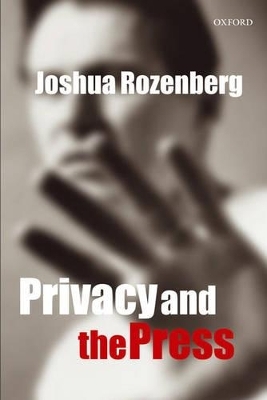
Privacy and the Press
Seiten
2005
Oxford University Press (Verlag)
978-0-19-928847-2 (ISBN)
Oxford University Press (Verlag)
978-0-19-928847-2 (ISBN)
Exposing the faults of celebrities and politicians is great for circulation figures, but where should we draw the line between legitimate public exposure and an individual's right to privacy? Addressing the question, this book explores how the English legal system has had to blend old laws on confidentiality with modern human rights law.
Do we need a law of privacy? Should judges be allowed to stop us reading about a footballer's adultery or enjoying pictures of a film star's wedding? Is a super-model's cocaine addiction something that she should be allowed to keep private? And aren't we entitled to walk down the street without having our most intimate activities recorded on security cameras and broadcast to the world?
These questions have divided not only the country but also our most senior judges. Drawing a line between justified and unjustified intrusion places great stresses on our legal traditions with some judges favouring an approach which stretches existing laws to grant relief to deserving victims, whilst other judges feel that it would be more honest to simply recognize privacy as a new human right. The latter approach creates further problems: should it be up to Parliament alone to create such a right? And what about free speech? Do the newspapers and the public not have rights too?
The issues raised are often highly emotive. Newspapers are not allowed to identify Thompson and Venables, the young men who murdered two-year-old James Bulger, because their lives would be in danger. Nobody may identify Mary Bell, who also killed when she was a child, even though there was no such risk. Will paedophiles be the next to demand lifelong anonymity?
Steering a course through this minefield requires a grasp of legal concepts and principles and an understanding of how the law develops. This book explores how the English legal system has had to blend old laws on confidentiality with modern human rights law in order to deal with these problematic issues. Written for non-specialists by one of Britain s best known legal journalists, this book provides a uniquely accessible guide to the legal aspects of this public debate.
Do we need a law of privacy? Should judges be allowed to stop us reading about a footballer's adultery or enjoying pictures of a film star's wedding? Is a super-model's cocaine addiction something that she should be allowed to keep private? And aren't we entitled to walk down the street without having our most intimate activities recorded on security cameras and broadcast to the world?
These questions have divided not only the country but also our most senior judges. Drawing a line between justified and unjustified intrusion places great stresses on our legal traditions with some judges favouring an approach which stretches existing laws to grant relief to deserving victims, whilst other judges feel that it would be more honest to simply recognize privacy as a new human right. The latter approach creates further problems: should it be up to Parliament alone to create such a right? And what about free speech? Do the newspapers and the public not have rights too?
The issues raised are often highly emotive. Newspapers are not allowed to identify Thompson and Venables, the young men who murdered two-year-old James Bulger, because their lives would be in danger. Nobody may identify Mary Bell, who also killed when she was a child, even though there was no such risk. Will paedophiles be the next to demand lifelong anonymity?
Steering a course through this minefield requires a grasp of legal concepts and principles and an understanding of how the law develops. This book explores how the English legal system has had to blend old laws on confidentiality with modern human rights law in order to deal with these problematic issues. Written for non-specialists by one of Britain s best known legal journalists, this book provides a uniquely accessible guide to the legal aspects of this public debate.
Joshua Rozenberg joined The Daily Telegraph as Legal Editor in 2000, and now writes a weekly column on the law. Before going into print he spent 25 years working at the BBC, the last 15 of these covering legal affairs for BBC News. He qualified as a solicitor in 1976 after taking a law degree at Oxford.
1. Confidence or Privacy? ; 2. Hello! OK? ; 3. A Free Press ; 4. Respecting Private Life ; 5. Privacy and the Press ; 6. A Chilling Effect ; 7. Responsible Journalism
| Erscheint lt. Verlag | 28.7.2005 |
|---|---|
| Verlagsort | Oxford |
| Sprache | englisch |
| Maße | 156 x 233 mm |
| Gewicht | 427 g |
| Themenwelt | Informatik ► Netzwerke ► Sicherheit / Firewall |
| Recht / Steuern ► EU / Internationales Recht | |
| Recht / Steuern ► Privatrecht / Bürgerliches Recht ► Medienrecht | |
| Sozialwissenschaften ► Kommunikation / Medien ► Journalistik | |
| Sozialwissenschaften ► Politik / Verwaltung | |
| Wirtschaft | |
| ISBN-10 | 0-19-928847-X / 019928847X |
| ISBN-13 | 978-0-19-928847-2 / 9780199288472 |
| Zustand | Neuware |
| Haben Sie eine Frage zum Produkt? |
Mehr entdecken
aus dem Bereich
aus dem Bereich
Das Lehrbuch für Konzepte, Prinzipien, Mechanismen, Architekturen und …
Buch | Softcover (2022)
Springer Vieweg (Verlag)
34,99 €
Management der Informationssicherheit und Vorbereitung auf die …
Buch (2024)
Carl Hanser (Verlag)
69,99 €


